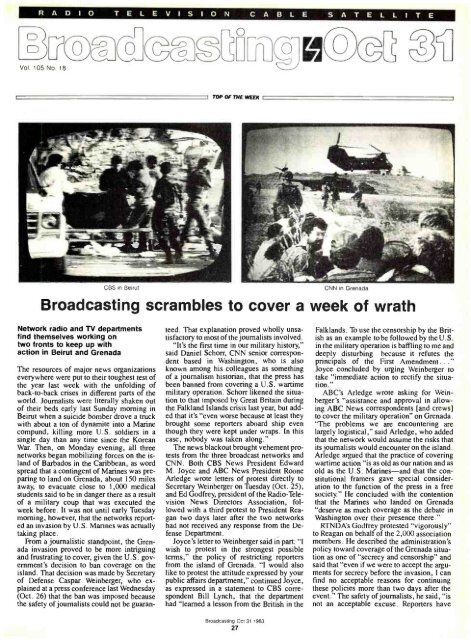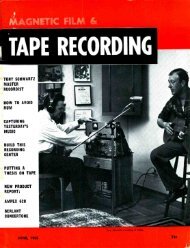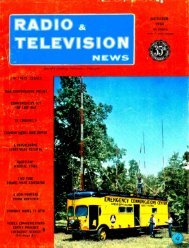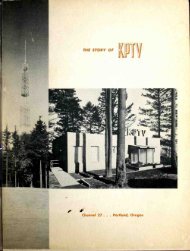Broadcasting Oct 31 - American Radio History
Broadcasting Oct 31 - American Radio History
Broadcasting Oct 31 - American Radio History
You also want an ePaper? Increase the reach of your titles
YUMPU automatically turns print PDFs into web optimized ePapers that Google loves.
O<br />
R A D I O T E L E V I S I O N C A B L E S A T E L L I T E<br />
Vol. 105 No. 18 Eci-@<br />
co<br />
-1 TOP OF THE WEEK 1<br />
CBS in Beirut CNN ir Grera7a<br />
<strong>Broadcasting</strong> scrambles to cover a week of wrath<br />
Network radio and TV departments<br />
find themselves working on<br />
two fronts to keep up with<br />
action in Beirut and Grenada<br />
The resources of major news organizations<br />
everywhere were put to their toughest test of<br />
the year last week with the unfolding of<br />
back -to -back crises in different parts of the<br />
world. Journalists were literally shaken out<br />
of their beds early last Sunday morning in<br />
Beirut when a suicide bomber drove a truck<br />
with about a ton of dynamite into a Marine<br />
compund, killing more U.S. soldiers in a<br />
single day than any time since the Korean<br />
War. Then, on Monday evening, all three<br />
networks began mobilizing forces on the is-<br />
land of Barbados in the Caribbean, as word<br />
spread that a contingent of Marines was pre-<br />
paring to land on Grenada, about 150 miles<br />
away, to evacuate close to 1,000 medical<br />
students said to be in danger there as a result<br />
of a military coup that was executed the<br />
week before. It was not until early Tuesday<br />
morning, however, that the networks report-<br />
ed an invasion by U.S. Marines was actually<br />
taking place.<br />
From a journalistic standpoint, the Gren-<br />
ada invasion proved to be more intriguing<br />
and frustrating to cover, given the U.S. gov-<br />
ernment's decision to ban coverage on the<br />
island. That decision was made by Secretary<br />
of Defense Caspar Weinberger, who ex-<br />
plained at a press conference last Wednesday<br />
(<strong>Oct</strong>. 26) that the ban was imposed because<br />
the safety of journalists could not be guaran-<br />
teed. That explanation proved wholly unsa-<br />
tisfactory to most of the journalists involved.<br />
"It's the first time in our military history,"<br />
said Daniel Schorr, CNN senior correspon-<br />
dent based in Washington, who is also<br />
known among his colleagues as something<br />
of a journalism historian, that the press has<br />
been banned from covering a U.S. wartime<br />
military operation. Schorr likened the situa-<br />
tion to that imposed by Great Britain during<br />
the Falkland Islands crisis last year, but add-<br />
ed that it's "even worse because at least they<br />
brought some reporters aboard ship even<br />
though they were kept under wraps. In this<br />
case, nobody was taken along."<br />
The news blackout brought vehement pro-<br />
tests from the three broadcast networks and<br />
CNN. Both CBS News President Edward<br />
M. Joyce and ABC News President Roone<br />
Arledge wrote letters of protest directly to<br />
Secretary Weinberger on Thesday (<strong>Oct</strong>. 25),<br />
and Ed Godfrey, president of the <strong>Radio</strong> -Tele-<br />
vision News Directors Association, fol-<br />
lowed with a third protest to President Rea-<br />
gan two days later after the two networks<br />
had not received any response from the De-<br />
fense Department.<br />
Joyce's letter to Weinberger said in part: "I<br />
wish to protest in the strongest possible<br />
terms," the policy of restricting reporters<br />
from the island of Grenada. "I would also<br />
like to protest the attitude expressed by your<br />
public affairs department," continued Joyce,<br />
as expressed in a statement to CBS corre-<br />
spondent Bill Lynch, that the department<br />
had "learned a lesson from the British in the<br />
<strong>Broadcasting</strong> <strong>Oct</strong> <strong>31</strong> 1983<br />
27<br />
Falklands. To use the censorship by the Brit-<br />
ish as an example to be followed by the U.S.<br />
in the military operation is baffling to me and<br />
deeply disturbing because it refutes the<br />
principals of the First Amendment..."<br />
Joyce concluded by urging Weinberger to<br />
take "immediate action to rectify the situa-<br />
tion."<br />
ABC's Arledge wrote asking for Wein-<br />
berger's "assistance and approval in allow-<br />
ing ABC News correspondents [and crews]<br />
to cover the military operation" on Grenada.<br />
"The problems we are encountering are<br />
largely logistical," said Arledge, who added<br />
that the network would assume the risks that<br />
its journalists would encounter on the island.<br />
Arledge argued that the practice of covering<br />
wartime action "is as old as our nation and as<br />
old as the U.S. Marines -and that the con-<br />
stitutional framers gave special consider-<br />
ation to the function of the press in a free<br />
society." He concluded with the contention<br />
that the Marines who landed on Grenada<br />
"deserve as much coverage as the debate in<br />
Washington over their presence there."<br />
RTNDA's Godfrey protested "vigorously"<br />
to Reagan on behalf of the 2,000 association<br />
members. He described the administration's<br />
policy toward coverage of the Grenada situa-<br />
tion as one of "secrecy and censorship" and<br />
said that "even if we were to accept the argu-<br />
ments for secrecy before the invasion, I can<br />
find no acceptable reasons for continuing<br />
these policies more than two days after the<br />
event." The safety of journalists, he said, "is<br />
not an acceptable excuse. Reporters have<br />
I

















